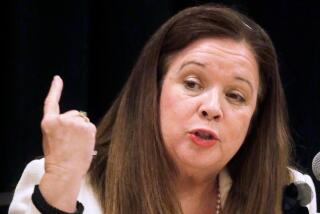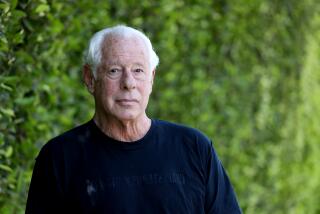Different approaches for two men at center of ‘torture memo’ controversy
As demands mounted Tuesday for sanctions against Bush administration lawyers who wrote so-called torture memos, one fiercely defended his legal justification for harsh interrogation tactics while another stuck to a carefully honed policy of silence.
Law professor John C. Yoo confronted the allegations that he bent the law to condone violations of international treaties against torture. By contrast, his former boss at the Justice Department’s Office of Legal Counsel, Jay S. Bybee, remained in his chambers at the Las Vegas courthouse where he holds a lifetime appointment as a federal appeals court judge.
Bybee was an assistant attorney general in the frantic months after the Sept. 11, 2001, terror attacks. Since President Bush appointed him to the U.S. 9th Circuit Court of Appeals six years ago, he has maintained a low profile, declining to talk about his role in shaping the administration’s treatment of terror suspects.
Bybee’s approach contrasts sharply with that of Yoo, his former deputy, who is now a tenured law professor at UC Berkeley and a strong defender of the Bush administration’s tactics.
Of the four lengthy legal memos released by the White House last week, the one written by Bybee, 55, was the most controversial.
Some critics of the Bush administration say Yoo has taken a disproportionate share of the public condemnation over the memos. “It’s important not to focus too much on scapegoating professor Yoo. He was a subordinate of Judge Bybee,” said Katherine Darmer, a professor at Chapman University School of Law, where Yoo is a visiting professor this semester. “Jay Bybee has not been held accountable for his central role in these memoranda.”
‘Was it worth it?’
At a spirited forum Tuesday at the Orange County school, Yoo, who was the author of much of the legal rationale for using waterboarding and other severe interrogation techniques, defended his legal guidance as correct and necessary to protect the nation.
“Three thousand of our fellow citizens had been killed in a deliberate attack by a foreign enemy,” Yoo, unruffled by shouts that he is a war criminal and should be in jail, told a packed auditorium on the Orange County campus. “That forced us in the government to have to consider measures to gain information using presidential constitutional provisions to protect the country from further attack.”
In a war with a non-state enemy that doesn’t follow international law, getting information from captured combatants is vital, Yoo said, contending that 50% of U.S. intelligence about Al Qaeda was gleaned from interrogations.
“Was it worth it?” he asked, brushing off the reproachful reaction. “We haven’t had an attack in more than seven years.”
Yoo’s confident appearance at the forum, where protesters hoisted placards demanding his prosecution, coincided with demands from some legal scholars and human rights advocates that Bybee resign from the federal bench and both men be called before an investigative tribunal.
Independent inquiry
Yoo’s defense of the legal advice given Bush -- that U.S. commitment to laws and treaties banning torture didn’t apply to terror suspects -- was bolstered by John C. Eastman, the Chapman law school dean. President Obama’s suggestion of convening an independent inquiry -- where immunity from prosecution would be exchanged for truthful testimony under oath -- was rejected by Eastman as unnecessary and likely to evolve into a partisan witch hunt.
Other legal scholars on both sides of the political spectrum, though, supported the notion of a nonjudgmental inquiry to shed light on the policies the Bush administration adopted and the legal advice it received.
Impeachment of Bybee, which some of his critics have called for, would be “ugly and distracting,” said Douglas Kmiec, a Pepperdine University law professor who was head of the Office of Legal Counsel for the administrations of Presidents Reagan and George H. W. Bush.
“Better to impanel a thoughtful body of citizens to do a Nuremberg-style inquiry, but without any predetermined bias in favor of either removal from office or criminal prosecution,” Kmiec said.
Yoo, 41, alluded to his own uncomfortable situation at the liberal university where he has tenure, thanking the Chapman administration for giving him the opportunity to escape “the jurisdiction of the People’s Republic of Berkeley.”
Yoo dismissed the legal arguments put forward by two fellow law professors at Chapman, Darmer and Lawrence Rosenthal, saying “they would rule out any form of coercive interrogation no matter who we had -- including and up to Osama bin Laden.”
Darmer pointed out that the U.S. government defined waterboarding -- a practice that simulates drowning -- as torture and prosecuted those who conducted it until the Bush administration revised the legal framework.
“There’s an enormous difference between the use of executive power to free slaves and the use of it to condone torture,” said Darmer, pointedly putting distance between herself and her “temporary colleague.”
Rosenthal said the legal advice Yoo and Bybee provided was so flawed and unsustainable that the Bush administration itself eventually renounced it. A Bybee successor in the Office of Legal Counsel, Steven G. Bradbury, said in January -- five days before Obama’s inauguration -- that he disagreed with his predecessors’ views that the president wasn’t bound by laws constraining the treatment of prisoners.
Dissecting language
Bybee’s controversial memo was a dissection of treaty and statutory language prohibiting torture and cruel or inhumane treatment.
“We conclude that for an act to constitute torture, it must inflict pain that is difficult to endure,” Bybee wrote in the Aug. 1, 2002, guidance for CIA interrogators. “Physical pain amounting to torture must be equivalent in intensity to the pain accompanying serious physical injury, such as organ failure, impairment of bodily function, or even death.”
Bybee, an Oakland native and former University of Nevada Las Vegas law professor, did not return calls from The Times about the growing storm of protest against him.
Common Cause, the American Society of Law Teachers and a coalition of human rights advocates led by the Center for Constitutional Rights called on Bybee to resign, proclaiming him unfit to decide questions of law.
--
More to Read
Sign up for Essential California
The most important California stories and recommendations in your inbox every morning.
You may occasionally receive promotional content from the Los Angeles Times.










